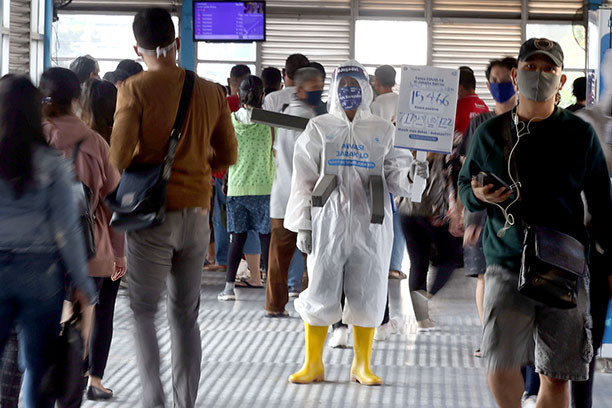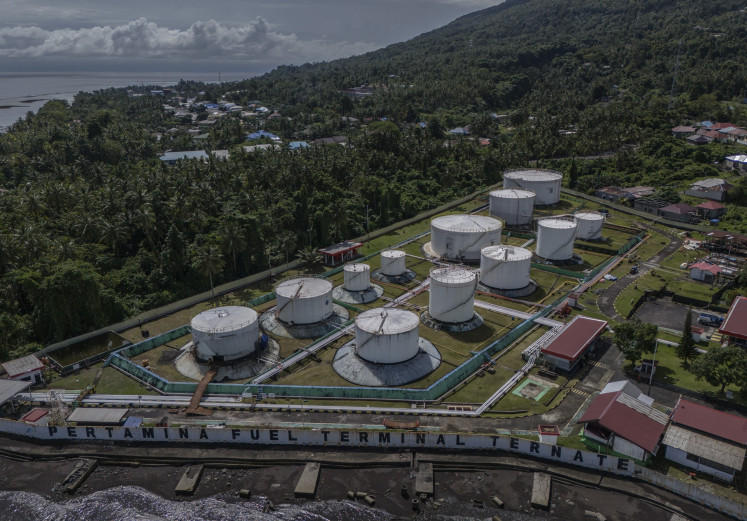Popular Reads
Top Results
Can't find what you're looking for?
View all search resultsPopular Reads
Top Results
Can't find what you're looking for?
View all search resultsJakarta stands its ground on COVID-19 rules as cases soar
Change text size
Gift Premium Articles
to Anyone
J
akarta Governor Anies Baswedan is once again considering pulling the emergency brake to stop the gradual reopening of the economy as cases of COVID-19 continue to soar in the capital city.
The city recorded 565 new COVID-19 cases on Wednesday, bringing the total number of confirmed cases to 31,162, with 9,047 active cases and 1,046 deaths. On Tuesday, Jakarta had recorded 505 new COVID-19 cases. It has now reclaimed the status as the country’s epicenter of virus transmission, passing East Java, which had recorded 28,551 cases as of Tuesday.
“I advise all residents to continue to wear a mask at all times. If you have any ailments, please report it to us and we will conduct a medical test,” Anies said on Monday. “About the emergency brake and so forth, we will monitor [the situation] for a few days ahead.”
Anies vowed to closely monitor the positivity rate during the final days of the city's large-scale social restrictions (PSBB) period, which ends on Aug. 27.
It is the second time Anies has warned the public to exercise extra caution since Jakarta began relaxing restrictions on June 4.
He first issued a warning on July 12, hinting at a reinstatement of stricter PSBB measures after the city recorded its highest number of daily cases.
The COVID-19 positivity rate – the percentage of those tested who are found to be infected – in the city over the past three weeks is 8.9 percent, Jakarta Governor Anies Baswedan said, above the 5 percent threshold set by the World Health Organization for relaxing restrictions.
Deputy Governor Ahmad Riza Patria said restrictions could be reimposed if cases continued to soar and the city’s positivity rate reached above 10 percent, among other indicators.
"There are a lot of indicators. For example, if the [positivity] rate is substandard, an emergency break policy may be enacted [...] A positivity rate above 5 percent is alarming, while above 10 percent is considered dangerous," he said on Monday.
But Riza said transmission was still manageable, pointing to the 1.09 reproduction number, a measure of many new infections each case generates. Jakarta’s reproduction number has remained stable at between 0.9 and 1.13 since the beginning of the outbreak.
Riza also said the city's health facilities remained adequate to accommodate new patients, although occupancy rates were recorded at 65 percent for isolation beds and 67 percent for intensive care beds last Thursday.
The city health agency previously said the figure indicated a “very critical condition”, as more than half of the bed capacity was used on a daily basis.
Experts see Jakarta as being caught between a rock and a hard place: removing restrictions may restart the economy, but will also put public health at stake.
The city experienced its worst economic growth in the past decade during the second quarter of this year, down 8.22 percent from the same period last year, the latest report from the Jakarta Statistics Agency show. As businesses have suffered, so have people’s incomes, with Jakarta's household expenditure recording negative 5.23 percent year-on-year growth that could see it “longer be an economic driver in Jakarta”, the report stated.
Anies previously said that to keep the economy running, the city must first and foremost curb the outbreak to help consumer spending recover.
“[Curbing the spread of COVID-19] is key to restarting the economy. Unless we strive to contain the outbreak seriously, efforts to get the economy up and running will always face obstacles,” Anies said in a virtual meeting with media leaders last week.
Anies also said the pandemic could drag on in the capital if COVID-19 testing disparities between Jakarta and its surrounding cities persisted, describing the transmission as a ping pong ball that could bounce all over the place if people did not protect themselves.
Indonesian Public Health Expert Association (IAKMI) chairman Ede Surya Darmawan said public health was a responsibility shared by neighboring local administrations, as well as the central government. He expected greater intervention to come from the central government if local administrations failed to control transmission.
Should Jakarta decide to return to the strict PSBB measures, the city and the central government must first resolve the problems that have hindered the distribution of social aid, such as poor targeting.
“If [Jakarta] decides to pull the brake now, I fear the [authorities] will be unprepared. They need to prepare while continuing to improve testing and tracing,” Ede said.
Some 2.4 million Jakarta households financially impacted by the pandemic and have now registered as social aid recipients. The number of recipient households accounts for more than half the total number of households in the city.
University of Indonesia epidemiologist Tri Yunis Miko urged the city to reimpose stricter restrictions in Jakarta’s COVID-19 red zones and high risk areas.
On Sunday, three out of Jakarta’s five municipalities were classified as red zones.
“Too many people have underestimated [the disease] and ignored their safety. But the responsibility to enforce health protocols and improve discipline among people lies in the hands of the city administration," Tri said.










